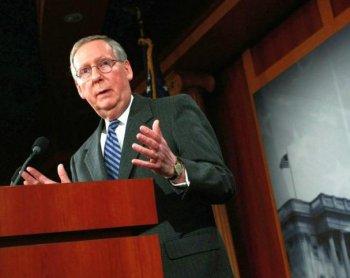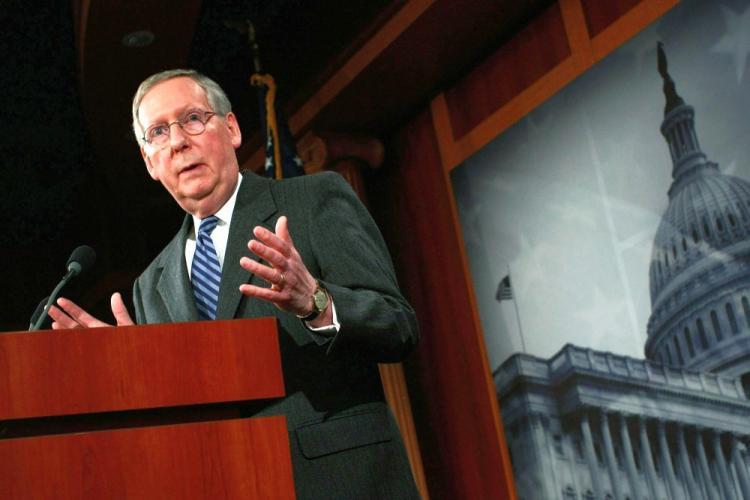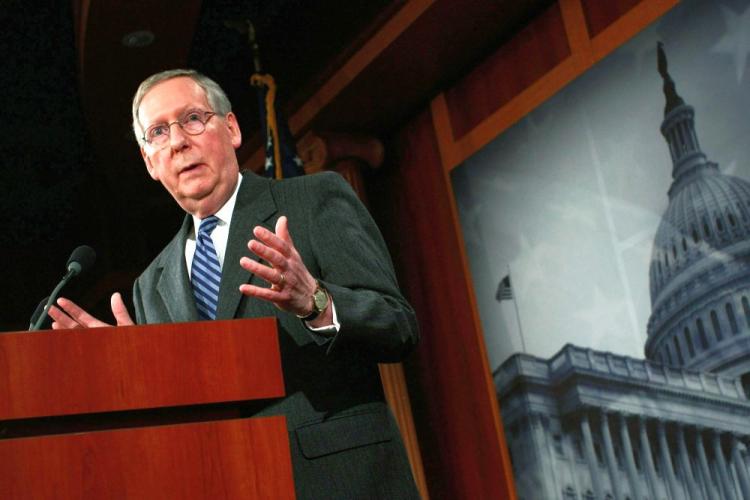Lawmakers who fought President Barack Obama’s stimulus package later lobbied to secure a portion of the money for their own states, according to a report from the Center for Public Integrity (CPI). The group said many Republicans and conservative Democrats voted against the American Recovery and Reinvestment Act and then requested funds in a “massive behind-the-scenes letter-writing and phone call campaign.”
In the report “Stimulating Hypocrisy: Scores of Recovery Act Opponents Sought Money Out of Public View,” CPI described how they collected a stack of letters—nearly a foot high—written by members of Congress seeking stimulus funds. CPI obtained the letters from both federal agency sources and through the Freedom of Information Act.
According to the CPI, the letters represent approximately 2,000 requests from lawmakers on both sides of the aisle for stimulus money. More than 1,500 of these letters were collected from the Transportation, Energy, and Commerce departments.
Many letters were written by members of Congress who had publicly opposed the spending bill. The report named Rep. Pete Sessions (R-Texas), Senior Senate Minority Leader Mitch McConnell (R-Ky.) and Rep. Mike Pence (R-Ind.), as well as former presidential candidates Ron Paul and John McCain.
“The correspondence provides a stark example of the gulf between political promises and action,” the report observed.
The $787 billion spending plan promised to “create new jobs and save existing ones, spur economic activity, and invest in long-term growth,” while providing “unprecedented levels of accountability and transparency in government spending.” The bill was designed to be free from the earmarks that lawmakers have long used to allocate money to their pet projects. Instead, funds would be handled by various government departments.
While the bill managed to avoid traditional earmarking, a behind-the-scenes lettermarking campaign involved lawmakers, including many who publically renounced the spending package, lobbying for grants. Ironically, according to spending experts, the bill’s efforts to avoid earmarks created a system where lawmakers still steered money toward pet projects but in an even less transparent way.
Other letter writers included Scott Brown (R-Mass.), and Rep. Michele Bachmann, (R-Minn.), who enjoyed significant Tea Party support. According to the CPI, “The letters particularly dismay conservative advocacy groups like the Tea Party and Americans for Tax Reform that have been backing Republicans in the fall election but now see a touch of hypocrisy among candidates they thought were conservative champions of federal spending cuts.”
If you’re interested in what stimulus projects representatives sought money for in your state, CPI offers each of the letters of congressional members’ lobbying efforts available in the report on their website.
In the report “Stimulating Hypocrisy: Scores of Recovery Act Opponents Sought Money Out of Public View,” CPI described how they collected a stack of letters—nearly a foot high—written by members of Congress seeking stimulus funds. CPI obtained the letters from both federal agency sources and through the Freedom of Information Act.
According to the CPI, the letters represent approximately 2,000 requests from lawmakers on both sides of the aisle for stimulus money. More than 1,500 of these letters were collected from the Transportation, Energy, and Commerce departments.
Many letters were written by members of Congress who had publicly opposed the spending bill. The report named Rep. Pete Sessions (R-Texas), Senior Senate Minority Leader Mitch McConnell (R-Ky.) and Rep. Mike Pence (R-Ind.), as well as former presidential candidates Ron Paul and John McCain.
“The correspondence provides a stark example of the gulf between political promises and action,” the report observed.
The $787 billion spending plan promised to “create new jobs and save existing ones, spur economic activity, and invest in long-term growth,” while providing “unprecedented levels of accountability and transparency in government spending.” The bill was designed to be free from the earmarks that lawmakers have long used to allocate money to their pet projects. Instead, funds would be handled by various government departments.
While the bill managed to avoid traditional earmarking, a behind-the-scenes lettermarking campaign involved lawmakers, including many who publically renounced the spending package, lobbying for grants. Ironically, according to spending experts, the bill’s efforts to avoid earmarks created a system where lawmakers still steered money toward pet projects but in an even less transparent way.
Other letter writers included Scott Brown (R-Mass.), and Rep. Michele Bachmann, (R-Minn.), who enjoyed significant Tea Party support. According to the CPI, “The letters particularly dismay conservative advocacy groups like the Tea Party and Americans for Tax Reform that have been backing Republicans in the fall election but now see a touch of hypocrisy among candidates they thought were conservative champions of federal spending cuts.”
If you’re interested in what stimulus projects representatives sought money for in your state, CPI offers each of the letters of congressional members’ lobbying efforts available in the report on their website.







